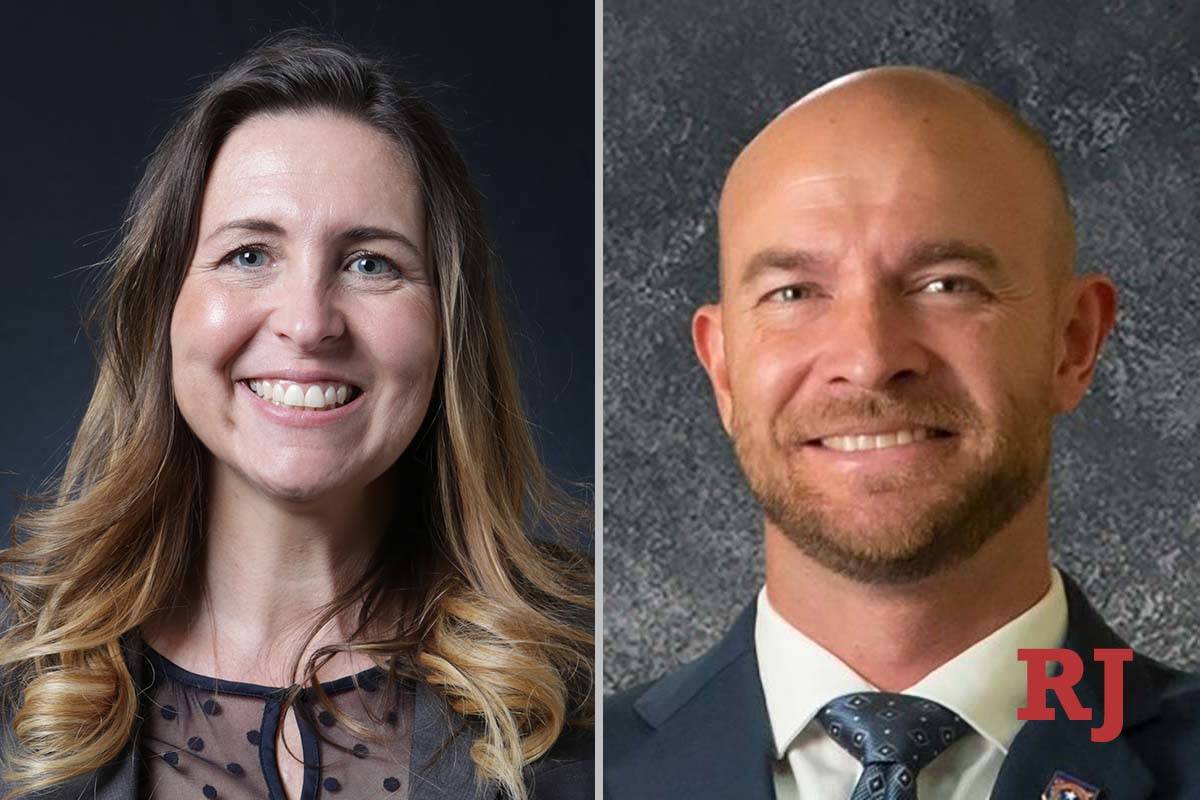Matthews challenging Backus in close Assembly District 37
An incumbent Democrat who narrowly won election by less than 150 votes two years ago is hoping to hold off a well-funded challenger looking to turn the swing Assembly District 37 back to Republican control in 2020.
Assemblywoman Shea Backus is coming off her first term in the Legislature, where she served on the Judiciary, Taxation and Growth and Infrastructure committees. She won the seat in 2018 by ousting incumbent Republican Jim Marchant by 135 votes.
Backus is being challenged by Republican Andy Matthews, who previously ran for Congress in 2016 and worked on the unsuccessful 2018 gubernatorial campaign of Republican Adam Laxalt. Matthews beat three other Republicans in the primary to advance to the general election.
For Democrats, it’s one of the key seats they need to hold to maintain their current supermajority.
The district is one of the tightest in terms of voter breakdown, with Democrats holding a narrow registration advantage of about 38 percent of active voters to Republicans’ 36 percent as of August.
The contest is also shaping up to be one of the most expensive legislative races of the cycle.
From 2019 to June 30 of this year — the most recent campaign finance reporting deadline — Matthews had spent nearly $190,000 on his campaign, a significant sum of money for an Assembly race.
But after the four-way primary, Matthews is trailing in cash on hand heading into the general election.
Backus, who didn’t have a primary challenger and had spent just $8,000 through the first six months of the year, had $137,000 in her campaign coffers as of June 30, while Matthews had roughly $40,000.
‘Net zero’ government
Backus said that looking ahead to 2021, any policies the state puts forward will need to be “net zero” policies financially, meaning that there is no added cost on the state’s coffers.
“More so than ever, we’re just not going to have money,” she said, referencing the budget tightening during the COVID-19 pandemic.
“We have to make sure we’re providing the necessary health care and providing education funding,” Backus added.
She said that if the state does have more money to work with than anticipated, it should put those dollars toward programs that get federal matching funds, such as nurse family partnerships.
Of the three proposals to change mining taxes that lawmakers will discuss in 2021, Backus said she prefers the plan that would change the rate from a 5 percent net proceeds to 7.75 percent gross proceeds tax, with 25 percent of the revenue earmarked for education and health care.
Any of those proposals, if passed again in 2021, would go to Nevada voters for final approval on the 2022 budget.
She is against raising sales taxes in the state, and in general she said that the state “can’t just go raise taxes.”
Backus, who has been endorsed by the Las Vegas police officers union, said the state should take a deeper look at the entire criminal justice system, and not just policing, if it wants to address systemic racism.
For her, that starts in the courts and looking at more reforms to the cash bail system that leaves people in a “vicious cycle.”
Backus has submitted several bill draft requests ahead of the 2021 session, which include proposals to increase transparency and clarify campaign finance reports filed by political candidates.
She said that she also wants to work on diversifying Nevada’s economy to be less dependent on gaming and tourism to better withstand economic downturns.
Different priorities
Matthews said he is running because he is “extremely concerned with the direction our state is heading.”
He criticized Democrats for cutting education funding during a special session in the summer as part of the state closing a $1.2 billion budget hole caused by the pandemic, and he noted that Democrats did infuse some money back into proposed cuts to stave off layoffs for state employees.
“They were basically giving the unions what they wanted,” Matthew said.
Matthews said he is generally against raising taxes, both on residents and on businesses — such as mining companies — saying he “would not support a tax on anyone right now.”
Instead, the state should look at cutting spending more if the budget crisis is worse than anticipated.
That includes a freeze on government hiring and pay increases, requiring one furlough day per month for state workers, auditing state agencies to find wasted spending and eliminating prevailing wage for construction projects.
On education, Matthews said he supports school choice and doesn’t think improving public schools is about “throwing more money into the system.”
Matthews said he opposes the criminal justice reform efforts put forth by Democrats in 2019 but said that he does support some reform efforts, such as making it easier for people who had served time in prison to re-enter society.
He also opposes several bills lawmakers passed in 2019 to address climate change, including the law that passed with unanimous support in both houses that requires 50 percent of the state’s energy production to come from clean-energy sources, such as wind and solar, by 2030.
“I think it goes too far,” Matthews said.
Contact Capital Bureau Chief Colton Lochhead at clochhead@reviewjournal.com. Follow @ColtonLochhead on Twitter.


















